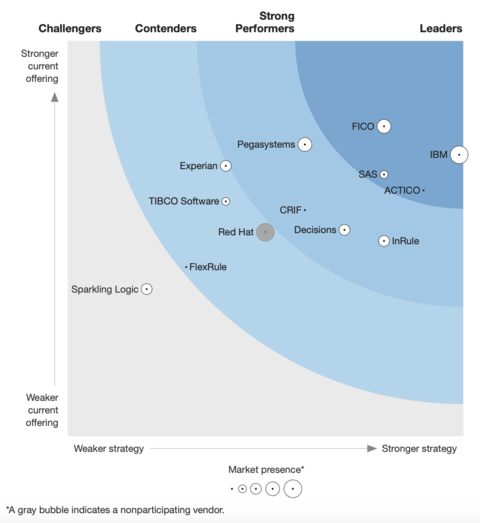Sign up for our newsletter

Enterprise Decision Management systems, or as they are now termed in the age of AI:
- Decision Automation [Us...]
- Decision Intelligence [Gartner...]
- Decision Optimization [IBM...]
- Decision Support [Various...]
- Intelligent Decisioning [SAS...]
- Digital Decisioning [Forrester...]
are making a comeback and fighting for market share against new AI platforms. As a system they are essentially using AI to make decisions, which is essentially what AI is for at its core, so a great fit.
Scope
We discuss at length exactly what a decision process is in our training and online courses but it is important to know which types of decision these systems manage today in the typical enterprise. Broadly speaking we can think of decisions tiered into 3 levels:
- Strategic - Business Direction
- Tactical - Business Management
- Operational - Business Processes
You might quibble over semantics but I think the framework is a straightforward and useful guide. Today our Decision Management System (DMS) is very much focused on level 3, Operational decisions that typically effect business processes, i.e. business process automation. However, as we move forward the leading tools are starting to move into the world of level 2, Tactical decisions that focus on managing operational systems.
In the coming years we will see these systems start to automate the enterprise management layer and also have the bonus effect of formalizing the enterprises decision processes, in the same way Business Process Management (BPM) formalized business processes.
Trends
The growth of these systems might be a surprise to some (I have found it unexpected) as many of them come from a legacy, rules based decision engine, world and might have been expected to be killed off by competition from newer AI platforms.
However, what I believe is playing out is possibly a trend that reccurs with every technology wave, which looks like this:
- New technology application / platform providers bring their shiney new toys to the enterprise but being so focused on the core technology they neglect to build out the necessary enterprise management functionality that is perhaps seen as a "nice to have" for the future.
- Legacy technology providers, who already have a major footprint in the enterprise and have already built into their offereings much of the necessary management functionality, start to extend their products with the new technology (AI in this case) and rebrand those products for the new world
A couple of key points here, when does the extended legacy finctionality pass the level of "good enough" and how quickly new vendors build out the enterprise management functionality into their products.
In the case of Decision Management Systems, they are already installed in many enterprises, in Analytics groups and they are a familiar entity with operating models and teams of expert users (analysts rather than data scientists). They have made slow but steady inroads into the AI feature space and can be plugged into external systems to to extend their capabilities. This makes them now a viable and potentially formidible competitor to their highly funded, native AI / data science platform challengers.
In the case of these AI platforms, they have only reletively recently started to focus on building out enterpise management features (decision design, mixing rules with AI, no data science usage, governance etc) and have allowed the legacy DMS's to catch up. I think for many of these platforms building out this functionality will be beyond their scope, budget and indeed expertise and they will fall out of favor in the enterprise space.
This situation is good for the enterprise buyer however and at some point in the near future, as probably happens in each technology wave, we will see some form of feature convergence.
Vendors
While I dont want to go into detail about the various vendors of these tools (see Gartner, Forrester etc reports) there is one key point worth mentioning given that I have generally been labeling these vendors as "legacy" and that is that there are also a small number of "AI native" Decision Management Systems that are not extensions of vanilla AI platforms. One example, and a very exciting platform, is Aera which has a current industry focus on supply chain automation (makes sense as a beachhead) another is Peak AI.
Forrester has a useful report on some of the key vendors, amongst wich are SAS, IBM, ACTICO, TIBCO, FICO, Experian, Pega Systems...

